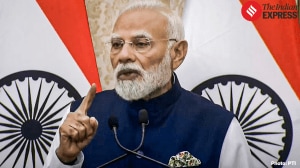Gujaratis leave their mark on new millennium
AHMEDABAD, NOV 19:On the midnight of December 31, 1999, if American planes don't drop from the sky, bank transactions don't go haywire an...

AHMEDABAD, NOV 19:On the midnight of December 31, 1999, if American planes don’t drop from the sky, bank transactions don’t go haywire and X-ray machines don’t zonk out, the country can thank Indians, many of them Gujaratis from aapnu Ahmedabad.
These are people who painstakingly sat through their COBOL programmes, scanning and rewriting millions of lines of quirky code, changing 99 to 1999 for mainframe computers so that the number doesn’t change to 00, causing complete chaos on the dawn of the new millennium.
Ahmedabad itself has provided at least 55 professionals trained exclusively in Y2K to American companies across the world and their branches in Asia, over the past three years. These young boys and girls, who were recruited at the CG Road-based IIS Advanced Technology Centre of IIS Infotech Ltd, have been placed at firms like HCL Perot System, Exchange Place Solution, USA; Sears, Toronto; IBM, India. And in the past three years, their task has been to update systems, make changes in programs andadd digits so that mainframe computers don’t conk out as the next century dawns.
Not only has IIS provided trained professionals to the world, it has also taken on assignments for companies like Merrill Lynch, AT&T, Blue Cross, Reuters, Apple and the European Parliament. “Though a number of Indian companies are doing Y2K work, we have the largest number of international clients,” says centre director Manoj Wadodaria.
Other companies that are also believed to be involved in the same kind of work are Infosys and Satyam. “Fifty per cent of the revenue of these companies has been coming from Y2K work over the past two years. It is laborious and low-tech work that people in the US do not want to waste their time and energy on, so they are happy to pass it on to Indian companies,” says Chirag Mehta, Managing Director of Ice Net.
The reason for the Y2K problem is that in earlier times, when the cost of memory space was very high, in many computers the date was stored in two digits instead of four. It wasrealised then that after 99, the computers would automatically change to 00. The only solution to the problem was to scan and rewrite COBOL code, changing 99 to 1999 so that it changes to 2,000 at the end of the millennium. Quick to realise that the American companies would be sourcing manpower from all over the world, many local companies started special courses in Y2K though the use of the course lapses in the next millennium.
“They can be placed in servicing and other sectors once the Y2K problem is tided over,” says Wadodaria.
Indian firms start training in Euro-conversion
This would involve making systems Euro-ready, conversion from national currencies like Franc and Pound to Euro, handling of historic data andmanagement of data while dual currencies are in use. “We have started a course in Euro conversion, but so far there have not been any takers from the city,” says Manoj Wadodaria, director, IIS Advanced Technology Centre.
“For companies that have so far been drawing revenue from Y2K, this is the perfect time to move to Euro. They will have work for the next two years at least,” says Chirag Mehta of Ice Net.





- 01
- 02
- 03
- 04
- 05








![Kadapa, [Andhra Pradesh], 27 May (ANI): Andhra Pradesh Chief Minister N Chandrababu Naidu and state Minister Nara Lokesh in conversation during the Telugu Desam Party's (TDP) annual three-day Mahanadu conclave, in Kadapa on Tuesday. (ANI Photo)](https://images.indianexpress.com/2025/05/tdp.jpg?w=300)

















